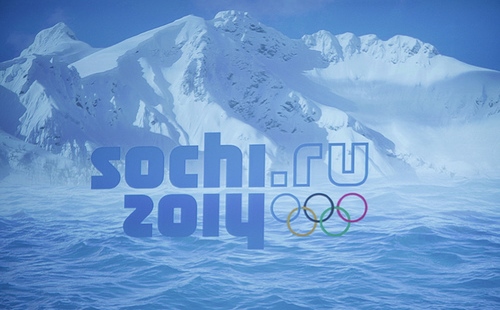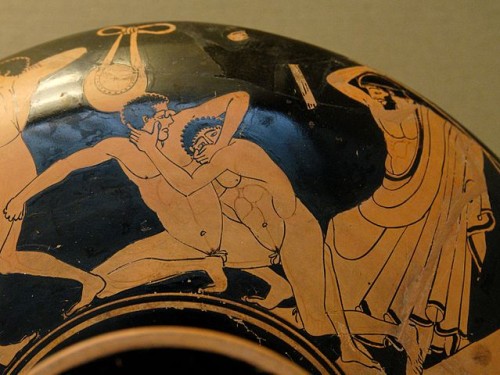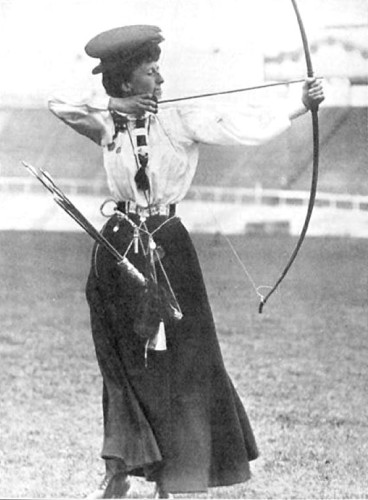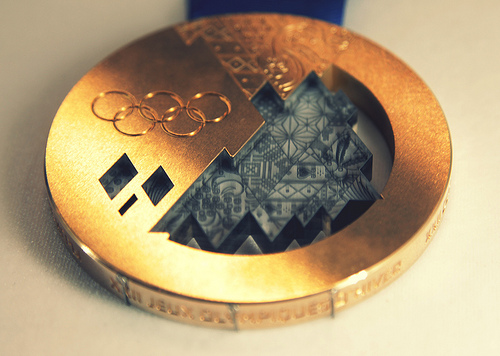This week the world turned its attention to the Black Sea resort town of Sochi, Russia as it became the host of the 2014 winter Olympic Games. Over the past year, the Sochi games have been over shadowed by a dark cloud of controversy stemming from Putin’s new “anti-gay” policies and the country’s on-going conflicts with Muslim extremists. In the face of protests and threats, the games began and have continued on with few minor incidents.

Courtesy of Flickr’s Global Sports Forum.
This is not the first time that the Olympic Games has found itself at the epicenter of the somewhat contentious crossroads of religion and politics. Being a true world stage, the modern Olympic Games create a spotlight that can highlight both the very best and the very worst in humanity. We have seen religious extremism in its ugliest form as well as intense spiritual devotion from an athlete raising a victory medal.
Interestingly, religion wasn’t always a sideshow or catalyst for political tension. It is believed that the Olympics themselves began as a sacred religious rite to honor Zeus. According to the Tufts University Perseus Project:
The Games were held in honor of Zeus, the king of the Greek gods, and a sacrifice of 100 oxen was made to the god on the middle day of the festival. Athletes prayed to the gods for victory, and made gifts of animals, produce or small cakes, in thanks for their successes.
During the Games a truce was established that allowed for the safe travel for worshippers, athletes and spectators. Eventually the event grew into a major athletic competition attracting people from all over the Ancient World. Even after Greece lost its political power, the Roman Empire kept the Olympics alive.

© Marie-Lan Nguyen / Wikimedia Commons
Although the Games eventually developed into a more secular event, its Pagan origin had not been forgotten. The Perseus Project explains:
Once the Roman emperors formally adopted Christianity, they discouraged and eventually, outlawed, old “Pagan” religious practices. Since the Olympic Games were first and foremost a religious celebration in honor of Zeus, they held no place in the Christian empire. The emperor Theodosius I legally abolished the games in 393 or 394 A.D.
The Olympics were born as a Pagan religious ritual and were eventually banned for that very same reason. By 393 A.D., the Olympics were gone … More or less.
According to Frank Deford of the Smithsonian magazine, there is historical evidence that small, local Olympic-style games were played around the world for many years. Some even used the name Olympics. For example, in Cotswald, England, a Roman Catholic staged an elaborate Olympick games to counter the “dour Protestantism of the time.”

1908 London Games (public domain photo)
Then in 1865 Pierre de Coubertin, founder of the modern games, traveled to Much Wenlock, England where William Penny Brookes had been holding local Games for years. Together both men aimed to bring back the romance and glory of the Ancient event. After much negotiation, Athens became the first host city for the modern Olympiad in 1896. The games were held in the fully restored ancient panathenaic stadium and the marathon was added to honor Ancient Greece.
The subsequent Olympics in Paris (1900) and St. Louis (1904) were largely disappointments. Needing to bolster more support and publicity for the cause, Coubertin looked to the Olympics’ roots and asked Rome to be the fourth host city. Unfortunately Mount Vesuvius erupted in 1906 which ended the country’s bid. So in 1908, London took up the reins and hosted the fourth Modern Olympic Games. Deford writes, “All else had been prelude only now had the modern Olympics truly begun.”
Although the Games’ original religious focus had not been resurrected alongside the showcase of athleticism, the modern games were not without religious influence. According to USA Today, De Courbin himself said, “The first essential characteristic of the Olympics, both ancient as well as modern, is to be a religion above and outside the churches.” Additionally, several Olympic mottos were coined by clergy such as “citius, altius, fortius” (faster, higher, stronger.)
Despite this joyful return, the political reality of faith-based conflict would eventually find its way into the Olympic spotlight. For example, at the 1936 Berlin games, Hitler outlawed German Jewish athletes from participating. The games were canceled in both 1940 and 1944 due to the Second World War. In 1972 11 Israeli athletes and coaches were held hostage by Palestinians at the Munich Games. This standoff ended in the death of all 11 Israelis and 5 of the Palestinians. Then in Atlanta in 1996, an Army of God fundamentalist detonated a bomb in a crowded Centennial Olympic Park.
Fortunately these violent conflicts are few and far between. Religious negotiations are more frequently found at the personal level when athletes find their faith in conflict with competition. For Muslims, this might be the wearing of headscarves in competition. For Jews, it might be the need to compete on a Saturday. The Olympics is a cauldron for the world’s cultural and religious diversity. The challenge is not just in the staging of the athletic venues or the choreography of the opening ceremonies. It is also in the bringing together of the world’s people representing an enormous range of beliefs, experiences and cultural expectations.

Sochi Gold Medal design. Photo Courtesy of Flickr’s Andy Miah
Let us return to the Sochi games – a Winter Olympics plaque by religious-inspired political controversy. Russia has certainly downplayed the issues to both the international community and its own population. Gwiddon Harvester, Pagan Federation Coordinator in Russia, says, “Putin will do everything in his power to keep Sochi scandal-free. He invested a lot of money in this project and this is his status-symbol… there is an entire army hidden in the mountains to ensure that terrorists will not disrupt the Games.”
Gwiddon shares that, in general, the Russian people are more upset about the “absurdly high” cost of Sochi than Putin’s policies or extremist threats. At the very most, Russia’s LGBT community is “annoyed that Putin made a ‘special dispensation’ for foreign guests in Sochi, allowing them to say whatever they please about gays, whereas the rest of [Russians] are effectively barred from speaking our minds in public about the issue.”
The Pagan Federation International in Russia has spoken out saying, “PFI supports protection of all human rights under the U.N. Charter of Rights, including the right to freedom from persecution on the grounds of sexual preference. Therefore, we are against the anti-gay laws, because they violate human rights.”

The issues plaguing Sochi have taken center stage as did the Munich hostage crisis, the Atlanta bombing and many other political conflicts that play out in the Olympic Arena. However religion isn’t only found at a crisis point. It is also found on the field, in the arena and on the slopes as athletes ask and offer blessings to their Gods and Goddesses within their faith’s tradition. In that way, the Olympics echoes its religious origins. Their God may not be Zeus but the ritual of prayer is ever present. Gwiddon remarks:
Several days before the games, the head of Russian Orthodox Church, Patriarch Kyrill, visited Sochi … and blessed the Russian team and the Games, asking for the Grace of God to descend upon them. The irony here is, of course … is that the very act of blessing the sports team is really a magical act, something one would expect in Ancient Rome and Greece.
From the regimented requirements of competition, the running of the marathon, the lighting of the giant cauldron, the torch relay, the Ancient Olympic spirit is alive and well. On Thursday, IOC President Thomas Bach spoke these words which were allegedly edited out of the NBC Friday night broadcast:
It is possible – even as competitors – to live together under one roof in harmony, with tolerance and without any form of discrimination for whatever reason. … [The] Olympic Games are a sports festival embracing human diversity in great unity … Please respect their Olympic Message of goodwill, of tolerance, of excellence and of peace.
The Wild Hunt is not responsible for links to external content.
To join a conversation on this post:
Visit our The Wild Hunt subreddit! Point your favorite browser to https://www.reddit.com/r/The_Wild_Hunt_News/, then click “JOIN”. Make sure to click the bell, too, to be notified of new articles posted to our subreddit.
My question is, why would NBC supposedly edit out such a bland and inoffensive statement as that? MSNBC is generally a open and liberal leaning media source (especially in comparison to Fox). I wish now that I had paid closer attention to the speeches made during the opening ceremonies so I could say definitively weather or not the editing had really happened.
I watched the broadcast on Friday night and heard that statement in it’s entirety. Why “allegedly” in this report?
Well, Slate quotes NPR Correspondent David Folkenflik as saying it was edited…
“NBC said the edit was simply a time issue. “IOC’s President was edited for time, as were other speeches, but his message got across very clearly,” NBC said in a statement, according to NPR’s David Folkenflik.”
http://www.slate.com/blogs/the_slatest/2014/02/08/thomas_bach_nbc_cuts_anti_discrimination_remarks_from_sochi_speech.html
https://twitter.com/davidfolkenflik/status/432173026529263616
Apparently there may be a time zone difference involved?
Why on Earth is Pagan Federation using such outmoded and inaccurate language as “sexual preference”? We expect our supporters to do better!